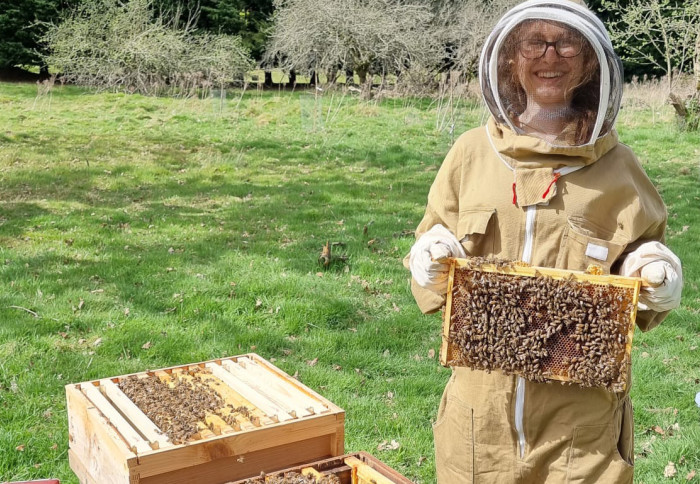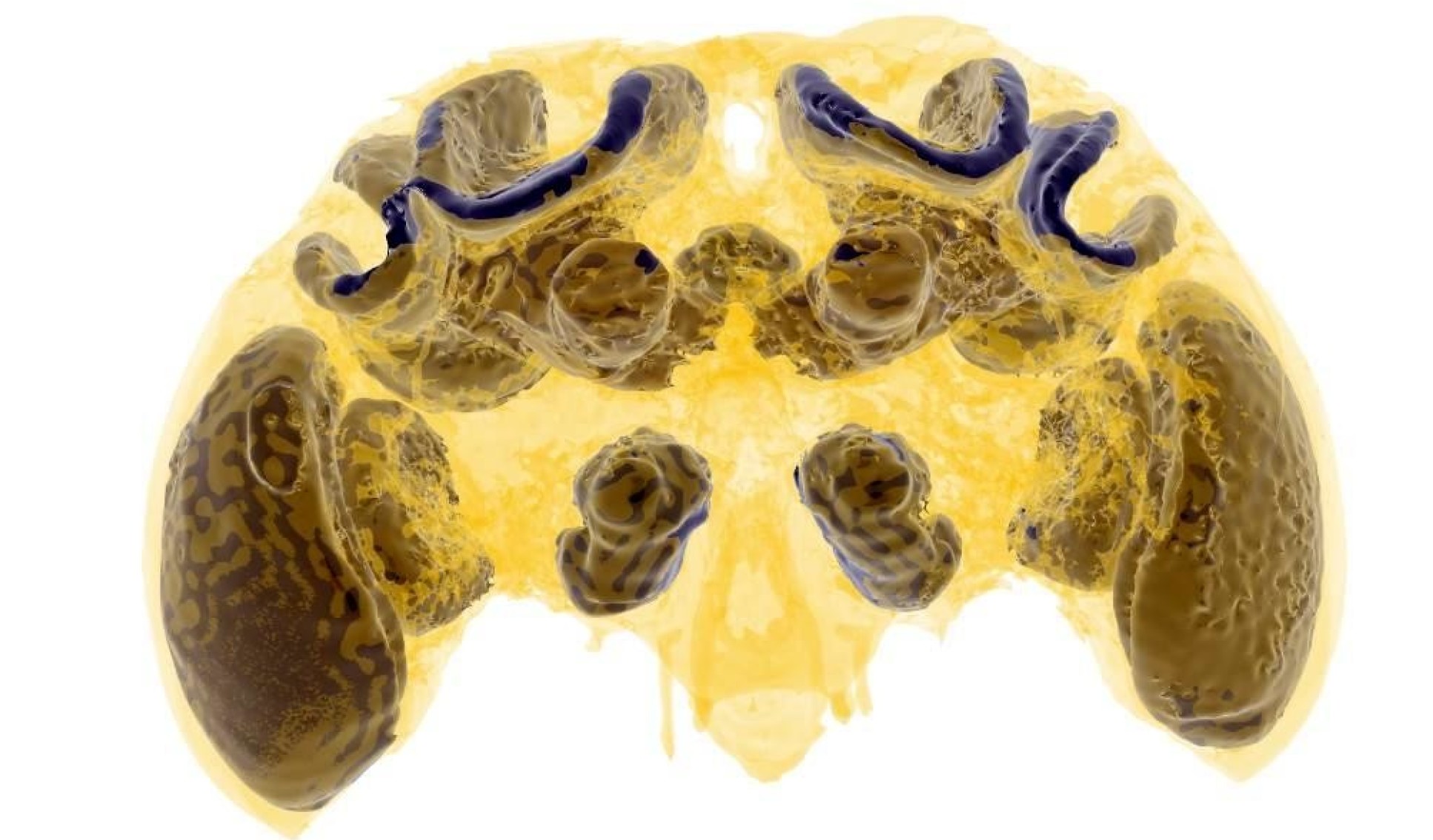World Bee Day: Imperial bee scientists share their research

World bee day celebrates the importance of bees in providing food security, sustainable agriculture, biodiversity, and the gentle buzz of summer.
Two groups of researchers, led by Drs Richard Gill and Peter Graystock based at Imperial’s Silwood Park campus, are investigating the threats bees face in the modern world.
Declines in bee populations are due to multiple stressors. Here we explore the teams’ work, looking into the effects of these stressors on bees and identifying ways to improve pollinator health and our food security.
Dr Peter Graystock, from the Department of Life Sciences (Silwood Park) at Imperial, said: “Worrying declines of pollinators over the past century is globally concerning, and having this day dedicated to bees gives us the chance to help promote their importance and clear up common misgivings!”
Pesticides and toxins
Foraging bees frequently come into contact with pesticides and other toxins which could pose a risk to their health. Work by both Dr Gill and Dr Graystock explores the influence of these chemicals on bee health. Using micro-CT scanning technology, Dr Gill and his PhD student Dylan Smith studied how bee’s brains develop and how growth is reduced if they are exposed to pesticides as babies (larvae).
The research, funded by the NERC and the Centre for Ecology and Evolution, found poor brain development can affect bees’ flight and their ability to pollinate plants. The research used developments in micro-CT scanning protocols made in their lab, including an analysis of baby bee brains in 2016, which lead to the study of baby bee brain development.

Now, collaborating with researchers in Germany, the team have created a 3D bumblebee brain atlas to enable future researchers to map cells and neurons to the bee brain and study stress effects.
Using a combined approach of next-generation sequencing and traditional culturing techniques, Dr Graystock is exploring the influence of harmful chemicals on the beneficial bacteria that live within the guts of bees.
Working with collaborators at the University of California Riverside, the team found variation in how different chemicals influenced the gut microbiome and in further work, it was shown that for some toxins, the microbiome protects bees from harm. Dr Graystock is now pioneering methods to utilise these natural microbes to protect bees from the toxic effects of harmful chemicals.
Land-use changes
Over the past century, there have been dramatic changes in land use with increases in urbanisation and agriculture leading to reductions in flowers and typical bee nesting sites. Along with PhD student Ana dos Ramos Rodrigues, Dr Gill is researching how bees cope with altered food availability combined with pesticide exposure as experienced in agricultural landscapes.
The team spent more than a year painstakingly monitoring nearly 100 bumblebee colonies during the project funded by the Biotechnology and Biological Science Research Council and Marie-Curie. The research aims to understand how the timing of food income and pesticide exposure could have longer-term effects on the quantity and quality of new queens and males being reared.
Dr Gill said: “We want to get to the bottom of why bees appear to do badly in agricultural sites despite flowering crops being available, as our previous research has shown.”
These long-term changes in habitat are likely to leave a genetic mark on bees as their populations ‘boom’ and ‘bust’. Dr Gill and a team of researchers from Queen Mary University London looked within the common bumblebee (Bombus terrestris) and found evidence of genetic changes that likely improved the bumblebees’ ability to forage further for food in response to increasing habitat fragmentation and changes in climate.
Dr Graystock’s student Tash Ramsden meanwhile is exploring the genetic structuring of multiple bee species in the UK in collaboration with researchers from University College London. The early findings indicate large differences in how different species have been responding to historical habitat changes.
Parasite spread
Emerging diseases are one of the leading drivers of species extinction, and in bees the researchers are finding the spread of disease goes much further than honeybees and bumblebees.
Dr Graystock explores disease dynamics across diverse wild bee communities to understand the drivers and help produce management strategies to improve bee health. In wild bee communities, he recently identified that having diverse bee communities in flower-rich landscapes can aid the reduction of parasites due to a decrease in successful transmission opportunities for the parasites.
In addition to work on wild bee communities, his PhD student Monika Yordanova is exploring the spread of destructive honeybee brood diseases – particularly European foul brood disease. Monika’s PhD is funded by the CB Dennis Trust and Bee Disease Insurance Ltd, to explore what causes this destructive disease to spread and the role landscape management may play in this. The results from Monika’s PhD will help the management of this deadly disease in honeybee populations.
Responses to climate change
As part of a large EU COST-Action on Sustainable pollination in Europe, Dr Graystock and team collected samples from across Europe to understand virus prevalence in wild bees in different climates. The study identified that not only are bee viruses linked to the climate, but this pattern occurs in both wild and managed bees alike. Worryingly, this suggests climate change may influence bee disease and pollination services in ways we do not yet understand enough to predict.
Ongoing work in the Arctic (Lapland) by Dr Gill, his PhD student Aoife Cantwell-Jones, and a host of Masters students are looking at how bumblebee communities are responding to climate change, and the effects this has on their interactions with flower species.
Funded by NERC, the Grantham Institute – Climate Change and the Environment, Queckett Microscopical Club and EU INTERACT, Dr Gill’s team have helped to re-establish a century-old transect, retracing the steps of past scientists to compare historic and contemporary bee data to understand the impacts in the most vulnerable biome in the world to climate change.
Bee foraging and teamwork
The various stressors bees encounter may have knock-on effects on their ability to forage or interact with their nestmates, which would pose a critical weakness in social colonies that depend on teamwork to produce the next generation of queen bees.

Dr Graystock has been exploring this with Masters students Acacia Tang and Paul Cabrisy. Acacia developed a technique to track bee movements in their colonies using QR tags, whilst Paul is developing machine-learning methods to record bees foraging without any tags on them.
These studies allow researchers to leverage cutting-edge technology to more rapidly identify and quantify changes in bee behaviour in response to changes in their environment.
Meet the researchers
On June 18-19, Dr Graystock and Dr Gill along with their teams and key collaborators will be hosting a drop-in workshop at the Great Exhibition Road Festival, so if you want to learn more about the importance of bees and pollinators, please come on down!
Article text (excluding photos or graphics) © Imperial College London.
Photos and graphics subject to third party copyright used with permission or © Imperial College London.
Reporter
Hayley Dunning
Communications Division
Peter Graystock
Department of Life Sciences (Silwood Park)
